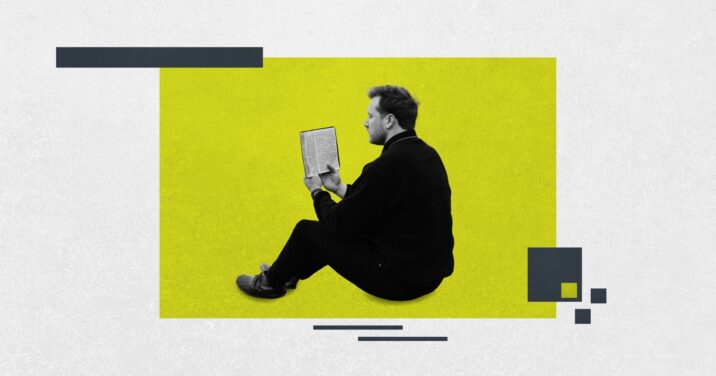The dates will always be easy to remember. January 6—the day the electoral votes were counted and the Capitol was stormed—was the day we learned the cancer had spread again, this time into places you can’t live without. January 20—Inauguration Day—was the day we learned that no viable treatments remained. It was time to set up hospice and make the plans no one wants to make.
About a year and a half before my father passed away, I happened across a neat little “reader’s edition” of the Bible in the clearance section of a local bookstore. No “Bible stuff” in the pages, just Bible. I read it cover to cover in a little less than three months. At the time, it seemed like just another way to read God’s word.
After my dad died, though, I no longer saw that trip through a reader’s edition as some sort of lark, as just something to do. I know it now as the Lord equipping me for what I was going to have to do in what turned out to be the end of my dad’s earthly life.
I’ve studied the Bible for as long as I can remember. There were story Bible lessons in Sunday school before I could read. There were deeper lessons and verse-by-verse exposition in youth group and at church camp. I took my Bible to college, and I read it. (Not as much as planned, but I read it.) Over the years, I used one devotional or another, one study system or another, and always kept up with the work of lamping my feet and lighting my path with the word.
Work and struggle
Reading the Bible was always work. It wasn’t always work I enjoyed. I struggled in part because I felt a need to piece together the verses I memorized into some kind of whole that made sense, a whole that never became apparent. There were doctrines I felt I should hold—I knew the prooftexts by heart. But some of them seemed at odds with each other, and that seemed at odds with Jesus’s claim that a house divided against itself cannot stand.
Solution
As is so often true, the answers weren’t laid out in the Bible in bullet points. There was no slide presentation waiting to spring into my mind’s eye in high definition. Instead, I found the promises of God in the Bible’s narrative as a whole. The solution to my Bible-reading problem suddenly occurred to me: I simply needed to read the entire Bible.
And I needed to read it quickly. Reading the entire Bible quickly left me feeling like Cleopas and his fellow-traveler on the road to Emmaus or the Ethiopian eunuch after his encounter with Philip: it was as if my eyes had been made to see and my mind opened to the fullness of God’s creation through the power of his gospel, a message that ran throughout all the Scriptures.
When the story of the Bible came pages at a time instead of sentence by broken sentence, it was immediately compelling. I couldn’t put Exodus down. I had to know what happened! I’d known for years what happened, but it felt to me like I was reading the story for the first time. Whole books of the Bible that had seemed hopelessly opaque clicked into place.
What in the world was I supposed to take away from a story in the last five chapters of Judges that would be edifying? (I don’t feel much at risk of repeating the vengeful acts of the Levite over his murdered concubine … )
It wasn’t until I took in the whole book of Judges at once that the phrases “The people of Israel did what was evil in the sight of the Lord” and “In those days there was no king in Israel; everyone did what was right in his own eyes” made sense and helped me understand the book.
When you see Judges’ kaleidoscope of horrors—the painful cycle of God’s people following their own lights instead of the paths of God—you see the photographic negative of the Pentateuch’s wonderful story: God’s good creation, what God expects of his people, what becomes of the law when God’s people become rivals instead of a nation of nations who together can finally walk with Joshua behind God’s providence and into his promise.
Yeshua echoes
It’s in a big read of the Bible that the name Joshua echoes most strongly—so strongly that it becomes the fundamental tone. Joshua; Yeshua; God will save. “And you shall call his name Jesus, for he shall save his people from their sins.”
If one big read of the Bible was good, I wondered if more might be better. I read through the Bible twice more before my dad died. I also read whole books any time I had the chance. Just as God was using Scripture to reveal his truth in general, he was revealing his grace to me in my place of despair and grief.
The evening after I read Job, I heard from my parents about how cancer was wearing out my six-foot-four-inch, solid-rock, teddy-bear father that week. As his end became so very real, I understood why Job only stopped pouring ashes on his head long enough to complain. But reading that book in one day, I couldn’t escape the answer Job got when God decided the complaining had gone on long enough: “Where were you when I laid the foundations of the world?” Well, where was I back then?
As my dad got sicker, I started resisting making plans, because I felt more and more like I needed to be ready for the worst. The afternoon I read Ecclesiastes, I felt I finally understood the Preacher.. It is all vanity. We are all dust. And yet the sun still rises from the womb of the dawn, looking down on what it’s seen before.
Prominent themes
Seeing God’s good creation, Israel’s repeated apostasy, Job and the Preacher and Paul working through affliction, the promise of things made new—seeing those truths all together in a short period of time brought home biblical themes for me in ways verse-at-a-time study never had.
We are to avoid idolatry, and great harm awaits us if we don’t. God is sovereign. He is the I AM, the I WILL BE, the author of life and of our salvation. We can trust him in our suffering and our grief just as fully as we can in our joy. Adam and Eve needed to be clothed by God; Moses needed to be covered by God; the Temple needed a curtain to protect the Israelites—that people of unclean lips—from God. But that curtain tore in two one Friday afternoon, from top to bottom! When Peter sank in the waves in front of Jesus, Jesus put him back in the boat.
When Peter and James and John saw Jesus transfigured, they didn’t need a veil for their faces or a coal for their lips. Jesus has accomplished the redemption the prophets pointed to. Jesus has righted the wrongs all the way back to Eden, all the way forward to the end of the age, and has begun to make all things new.
Even so, come!
And I saw, through considering the whole counsel of God, that God’s word had made its way deep inside me, into places I can’t live without. My prayer of grief over losing my dad needn’t remain “My God, my God, why hast thou forsaken me?” but can turn with sure and certain hope to “How long, Lord?”
Amen. Even so, come, Lord Jesus!
***
This article was originally published in the November/December 2021 issue of Bible Study Magazine. Slight adjustments, such as title and subheadings, may be the addition of an editor.
Related articles
- What We Need More Than the Mountaintop Experience with God
- Is Jesus Really My Friend?
- Anxiety’s Lies & the Bible’s Truths: A Working Theology
Related resources






